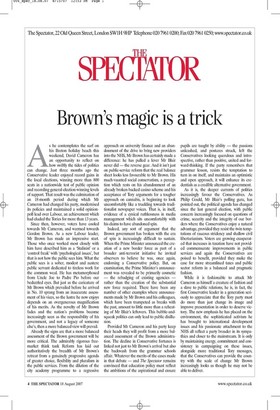Brown's magic is a trick
As he contemplates the surf on his Breton holiday beach this weekend, David Cameron has an opportunity to reflect on how swiftly the tides of politics can change. Just three months ago the Conservative leader enjoyed record gains in the local elections, winning more than 800 seats in a nationwide test of public opinion and recording general-election-winning levels of support. That result was the culmination of an 18-month period during which Mr Cameron had changed his party, modernised its policies and maintained a solid opinionpoll lead over Labour, an achievement which had eluded the Tories for more than 13 years.
Since then, however, voters have cooled towards Mr Cameron, and warmed towards Gordon Brown. As a new Labour leader, Mr Brown has made an impressive start. Those who once worked most closely with him have described him as a 'Stalinist' or a 'control freak' with 'psychological issues', but that is not how the public sees him What the public sees is a sober, modest and austere public servant dedicated to tireless work for the common weal. He has metamorphosed from Uncle Joe to Padre Pio before our bedazzled eyes. But just as the caricature of Mr Brown which prevailed before he arrived in No. 10 sprang from an inaccurate assessment of his vices, so the lustre he now enjoys depends on an overgenerous magnification of his merits. As the novelty of Mr Brown fades and the nation's problems become increasingly seen as the responsibility of his government, and not a legacy of someone else's, then a more balanced view will prevail.
Already the signs are that a more balanced assessment of the Brown government will be more critical. The admirably rigorous freemarket think tank Reform has laid out authoritatively the breadth of Mr Brown's retreat from a genuinely progressive agenda of greater choice, flexibility and pluralism in the public services. From the dilution of the city academy programme to a regressive approach on university finance and an abandonment of the drive to bring new providers into the NHS, Mr Brown has certainly made a difference: he has pulled a lever Mr Blair never did — the reverse gear. And it isn't just on public-service reform that the real balance sheet looks less favourable to Mr Brown. His much-vaunted social conservatism, a perception which rests on his abandonment of an already broken-backed casino scheme and his acceptance of Tory arguments for a tougher approach on cannabis, is beginning to look uncomfortably like a truckling towards traditionalist newspaper voices. That is, in itself evidence of a cynical ruthlessness in media management which sits uncomfortably with his claims to have abandoned spin.
Indeed, any sort of argument that the Brown government has broken with the era of spin is increasingly difficult to sustain. When the Prime Minister announced the creation of a new border force as part of a broader anti-terrorist initiative he invited observers to believe he was, once again, endorsing a Conservative policy. But, on examination, the Prime Minister's announcement was revealed to be primarily cosmetic — the rebadging of existing agencies — rather than the creation of the substantial new force required. There have been any number of other examples where announcements made by Mr Brown and his colleagues, which have been trumpeted as breaks with the past, amount to little more than a reheating of Mr Blair's leftovers. This bubble-andsqueak politics can only lead to public disillusion.
Provided Mr Cameron and his party keep their heads they will profit from a more balanced assessment of the Brown administration. The decline in Conservative fortunes is linked not just to Mr Brown's arrival but also the backwash from the grammar schools affair. Whatever the merits of the cases made in that debate — and The Spectator remains convinced that education policy must reflect the ambitions of the aspirational and ensure pupils are taught by ability — the passions unleashed, and postures struck, left the Conservatives looking querulous and introspective, rather than positive, united and forward-thinking. If the party remembers that grammar lesson, resists the temptation to turn in on itself, and maintains an optimistic and open approach, it will enhance its credentials as a credible alternative government.
As it is, the deeper currents of politics increasingly favour the Conservatives. As Philip Gould, Mr Blair's polling guru, has pointed out, the political agenda has changed since the last general election, with public concern increasingly focused on questions of crime, security and the integrity of our borders where the Conservatives enjoy a natural advantage, provided they resist the twin temptations of raucous stridency and shallow civil libertarianism. Voters are growing exasperated that increases in taxation have not provided commensurate improvements in public services and again the Conservatives are poised to benefit, provided they make the case for more streamlined taxes and public sector reform in a balanced and pragmatic fashion.
While it is fashionable to attack Mr Cameron as himself a creature of fashion and a slave to public relations, he is, in fact, the first Conservative leader in a generation seriously to appreciate that the Tory party must do more than just change its image and improve presentation in order to deserve victory. The new emphasis he has placed on the environment, the sophisticated activism he has brought to international development issues and his passionate attachment to the NHS all reflect a party broader in its sympathies and closer to the mainstream. It is only by maintaining energy, commitment and consistency in campaigning on these issues, alongside more traditional Tory messages, that the Conservatives can provide the country with the scale of change Mr Brown increasingly looks as though he may not be able to deliver.












































 Previous page
Previous page